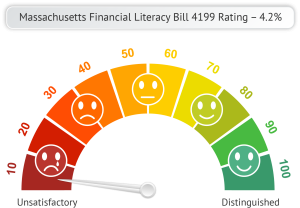
National Financial Educators Councils Review of Massachusetts Bill H.4199- An Act Related to Personal Financial Literacy
MA Financial Literacy Bill 4199 Fails to Meet Education Standards or Prepare Students for Financial Decisions, According to the NFEC
According to the National Financial Educators Council (NFEC), Bill H.4199 falls short of meeting 11 out of 12 fundamental measures of successful financial education programming. The NFEC gives the bill an overall rating of 4.2% out of 100. Delivery as a standalone one-semester course is the only measure with which the bill partially complies.
“Although well-intentioned, the bill fails to meet educational standards that would ensure optimal student outcomes from the coursework. The legislation as currently written raises concerns that some of the mandated topics may jeopardize students’ future financial well-being,” according to Vince Shorb, CEO of the NFEC. “The proposed legislation falls short of the rigorous educational standards to which other subjects are held and shows a lack of pedagogical depth.”
Shorb bases that opinion partly on the bill’s reliance on the term “understanding” as per the sentence “personal financial literacy standards established under section 1D shall promote an understanding of personal finances.” This term may signal an approach centered on students reaching lower-order thinking skills. The mere acquisition of understanding is a limited objective that risks leading to superficial learning experiences, Shorb says. Students would likely be susceptible to learning loss and the instruction would lack the rigor necessary to engender lasting positive impact on their financial well-being. The bill instead might use language consistent with educational frameworks such as Webb’s Depth of Knowledge and Bloom’s Taxonomy of Learning, which offer comprehensive strategies for incorporating higher-order thinking skills into the curriculum.
The NFEC points out that Bill H.4199 mandates teaching topics such as “crypto currencies and computer stock-trading.” While investing in cryptocurrency and computer stock trading are viable options for adults who have significant knowledge on the topics, risk capital, and clear investment objectives – teenagers may be unprepared for such investment decisions. Including these topics in high school-level courses also limits the time the teacher can spend focusing on near-term financial decisions graduates will soon face.
The proposed legislation provides no direct funding for the overall financial education initiative. Instead, the bill proposes to set up a trust fund designed to accept donations and other funding sources, with no resources set aside from the education budget.
Although Bill 4199 mentions teacher training, that training is only provided “subject to sufficient resources in the Financial Literacy Trust Fund.” Since no funding is set aside to fulfill the bill, teacher preparedness is not covered. According to Rand Education and Labor, “Teachers matter more to student achievement than any other aspect of schooling.” Classes led by well-qualified financial education instructors who follow well-chosen topics will have the greatest positive impact. The bill does not stipulate these qualifications.
Shorb further comments, “Preparing today’s youth to meet the financial decisions they will face upon graduation from high school is paramount to their success.” Although Bill H.4199 sets forth 41 topics educators are required to cover within 60 hours, handling debt does not appear on the list. “Given the more than $1 trillion in credit card and $1.7 trillion in student loan debt among Americans today, managing debt represents one of the most important lessons graduates need to learn.”
“We applaud the Legislature’s intent to foster financial well-being among the youth of Massachusetts,” states Ellis Cropper, a founding member of the Massachusetts Financial Educators Council. “However, the effectiveness of this legislation could be significantly enhanced by initiating personal finance education in elementary school. This early start for kids could lay the foundation for positive financial habits and rigorous instruction should extend through high school to equip youth for the financial realities of life.”
To help address the concerns raised, the National Financial Educators Council (NFEC) has developed a set of benchmarks for financial education at all grade levels, K-12. Policymakers can consult a guide – the “Policy and Standards Framework for High School Financial Education” – to help craft legislation that ensures the educational quality and learner outcomes to provide Massachusetts youth with the best possible financial wellness education.
The NFEC’s Policy & Framework Standards for High School Financial Literacy Education establishes two core objectives:
1) Elevate financial education mandates to meet standards of other core subjects;
2) Every student should graduate prepared for near-term financial decisions.
“When we fail to hold financial literacy to high standards, it’s our youth who suffer,” comments Vince Shorb, the NFEC’s CEO. “Massachusetts’ proposed financial literacy bill fails to meet even the basic educational standards applied to other subjects. If Bill 4199 is adopted, students will not graduate capable of making near-term financial decisions and may suffer the fate of most youth who find themselves struggling for financial independence.”
As an IACET Accredited provider, the National Financial Educators Council offers IACET CEUs for its learning events that comply with the ANSI/IACET Continuing Education and Training Standard. Their social impact mission includes gathering empirical evidence to empower and support financial wellness initiatives throughout the U.S. and around the world. The Massachusetts Financial Educators Council℠ is a state chapter of the National Financial Educators Council®.
Claudia Martins
National Financial Educators Council
+1 702-620-3059
email us here
Visit us on social media:
Facebook
Twitter
LinkedIn
Instagram
YouTube
Massachusetts Financial Literacy Mandate Bill 4199 - A Critical Review
EIN Presswire does not exercise editorial control over third-party content provided, uploaded, published, or distributed by users of EIN Presswire. We are a distributor, not a publisher, of 3rd party content. Such content may contain the views, opinions, statements, offers, and other material of the respective users, suppliers, participants, or authors.


